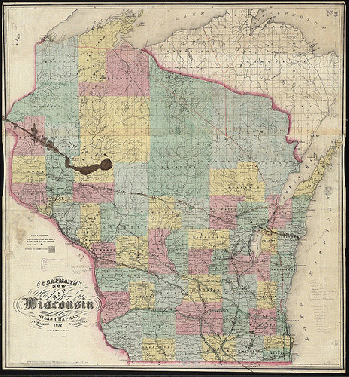My guest today is Rebecca Wilson, long-time election integrity advocate and co-director of the Maryland-based SAVE our Votes.
Joan Brunwasser: Welcome to OpEdNews, Rebecca. You've been closely following what's going on in Wisconsin. What're you finding so interesting over there? Following the 2016 election, there was a recount; it was done. Isn't it time to move on?
Rebecca Wilson: Joan, thanks for inviting me. The 2016 presidential election cycle was unusual in many ways, and new revelations about it still seem to be surfacing every day. We know that hackers who the intelligence community believes were tied to a foreign government attempted to penetrate the voter registration systems of a majority of states and were successful in at least two cases. There was also successful hacking of at least one vendor that supplies election products to multiple states. Computer scientists have been warning for years that our reliance on electronic voting equipment to cast and count votes makes our elections extremely vulnerable to attack, and provides many possible routes to manipulate the software which determines the outcomes.
With the integrity of our democracy at risk, it seems like a no-brainer to use voting systems that provide an independent means of checking our election results -- one which doesn't rely on software -- to make sure that the outcome accurately reflects the way people voted. Fortunately about 80% of presidential votes are now cast on paper ballots or electronic machines that provide a paper record of the vote that the voter can verify before casting it. By examining these paper records by hand and comparing them to the vote counts provided by the machines, it is possible to determine whether the two tallies match. Routine audits of a statistically significant number of randomly selected ballots or paper records should be able to confirm the accuracy of the results. Here's a great article about some states that are starting to do this type of auditing.
Unfortunately, since few states do any kind of meaningful verification of election results, the burden often falls upon recounts to provide this type of accuracy check on the voting system. Recount laws vary widely around the US but in most jurisdictions a losing candidate must be willing to risk being seen as a "sore loser," come up with an enormous amount of money for the recount, and recruit an army of volunteers to help oversee it just to confirm that the election results were correct. Few candidates are willing or able to do this, and even when anomalies are revealed, as they were in the 2000 election in Florida, our election calendar and laws do not provide much ability to find, investigate, or rectify mistakes or overturn results.
Some states, such as Minnesota, actually do get recounts right. While many people criticize the time it took to resolve the 2008 Franken/Coleman Senate race, the care and thoroughness of that recount was actually a sign of a healthy, thriving democracy. In a race that close with a Senate seat at stake, voters deserve to know that the winning candidate really won. People quickly lose interest in participating in a system they feel is "rigged."
So the best way to ensure that vote counts are correct is thorough audits -- the burden of proof should fall upon those who conduct the election to demonstrate the accuracy of their results before they certify them. But since that is rarely done in practice, we need fair recount laws that don't defy the public's interest in knowing that our election outcomes are true. The bill under consideration in Wisconsin would be a step backwards by placing greater restrictions on who can file for a recount and when they have to do it.
JB: Before we talk about the bill under consideration, can you talk a bit about what actually happened during the recount? It was clear that Jill Stein did not hope to overturn the Wisconsin results (or Pennsylvania or Michigan, for that matter) to forward her own candidacy. So, in your opinion, was it legit of her to request and raise money for the recounts?
RW: The point of the Stein recount was to try to learn whether the vote count was accurate, given the very real possibility that election systems could have been hacked. The three states chosen to recount were each decided by a slim margin of victory -- but not small enough to trigger a recount that the state would pay for. Each had a discrepancy between exit polls and reported election results that swung the state to the opposite candidate.
Jill Stein felt that an election that close with results that surprising should be reviewed thoroughly, so she stepped forth to represent the public's interests in verifying the outcome. The fact that she was able to raise millions of dollar in less than a week to pay for the recounts -- far more than she had raised for her candidacy and largely from people who did not vote for her -- shows that a lot of voters shared her concerns. For many years, the Green Party has raised questions about the fair conduct of American elections and especially our reliance on electronic voting equipment. Greens have been involved in previous presidential recounts so her decision was consistent with her party's priorities.
Of the three states in which Stein filed, only Wisconsin actually conducted recounts. Michigan's recount was stopped by the courts. Both Wisconsin and Michigan vote primarily on paper ballots counted by optical scanners, so both were good locations for recounts.
Pennsylvania is a very different story. Eighty percent of Pennsylvania voters cast their ballots on an antique patchwork of electronic voting machines that provide no voter-verifiable paper trail, so true recounts are not possible there. And Pennsylvania's recount laws are complicated. Candidates' recount rights are limited but voters may file for recounts directly -- but only for the polling place in which they voted and only if at least three voters from that same polling place request a recount. So, over Thanksgiving weekend, there was a massive organizing effort to find and coordinate thousands of voters to file notarized affidavits first thing Monday morning at their county election offices. Meanwhile, Stein's legal team pursued filing at the state and county levels.
(Note: You can view every article as one long page if you sign up as an Advocate Member, or higher).








